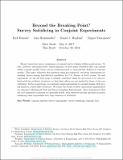Beyond the breaking point? Survey satisficing in conjoint experiments
Author(s)
Bansak, Kirk; Hainmueller, Jens; Hopkins, Daniel J.; Yamamoto, Teppei
DownloadSubmitted version (622.9Kb)
Open Access Policy
Open Access Policy
Creative Commons Attribution-Noncommercial-Share Alike
Terms of use
Metadata
Show full item recordAbstract
Recent years have seen a renaissance of conjoint survey designs within social science. To date, however, researchers have lacked guidance on how many attributes they can include within conjoint profiles before survey satisficing leads to unacceptable declines in response quality. This paper addresses that question using pre-registered, two-stage experiments examining choices among hypothetical candidates for US Senate or hotel rooms. In each experiment, we use the first stage to identify attributes which are perceived to be uncorrelated with the attribute of interest, so that their effects are not masked by those of the core attributes. In the second stage, we randomly assign respondents to conjoint designs with varying numbers of those filler attributes. We report the results of these experiments implemented via Amazon's Mechanical Turk and Survey Sampling International. They demonstrate that our core quantities of interest are generally stable, with relatively modest increases in survey satisficing when respondents face large numbers of attributes.
Date issued
2019-05Department
Massachusetts Institute of Technology. Department of Political ScienceJournal
Political Science Research and Methods
Publisher
Cambridge University Press (CUP)
Citation
Bansak, Kirk et al. "Beyond the breaking point? Survey satisficing in conjoint experiments." Political Science Research and Methods (May 2019): dx.doi.org/10.1017/PSRM.2019.13 © 2019 The European Political Science Association
Version: Original manuscript
ISSN
2049-8489
2049-8470